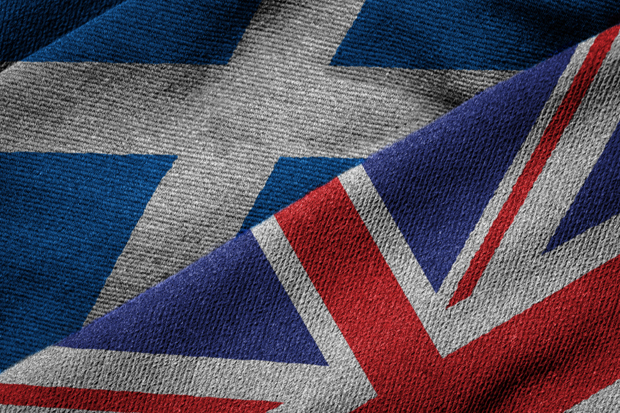Last year, the United Kingdom came within 384,000 votes of destruction. A referendum designed to crush the Scottish nationalists instead saw them win 45 per cent of the vote — and become stronger than ever. Since then, the SNP has taken almost every Scottish seat in the Commons and is preparing for another landslide in the Holyrood election next year — giving Nicola Sturgeon the power to threaten a second referendum. We may be just a few years away from a second battle for Britain.
In her short time as First Minister, Sturgeon has established herself as one of the most formidable politicians in Europe. She has raised a rebel army that she inspires with talk of destiny and dreams — while her opponents drone on about banks and the Barnett formula. Perhaps her single greatest achievement is to persuade voters on both sides of the border that the Scots and English are growing apart; that since devolution, the two countries have begun to see the world in such different ways that the only sensible option is to file for divorce.
In fact, the reverse is true. The SNP’s talk of discord conceals an inconvenient truth. Since devolution, opinions either side of the border have been converging. The British Social Attitudes Survey, widely acknowledged as the gold standard of polling, collects data nationwide but seldom focuses on how opinion varies regionally. A study of its raw data by The Spectator has shown that the difference of opinion between Scotland and England is now smaller than between the south-east and south-west of England.
The SNP portrays a Scotland united in its loathing of Tory welfare reform and rejoicing in the rejection of university tuition fees. In fact, while there is a quarrel between political elites, public opinion is consistent across the UK. The idea that some students should pay the cost of their own tuition is supported by a majority in Scotland as well as in England. Most Scots support the welfare cap that the SNP abhors and they are, if anything, more likely to believe that ‘people on the dole are fiddling in one way or another’. Since devolution, there has been a sharp rise in Scots agreeing with the splendidly patriotic notion that the world would ‘be a better place if people from other countries were more like the British’.
Our great country certainly has its internal differences. A Londoner is four times as likely as a Yorkshireman to trust government to put ‘country before party’, and twice as likely to go to church. London has the most religious population in Britain, north-east England the most secular. But there is simply no great divide between ordinary northerners and southerners, in spite of the politicians’ squabbles. Scottish politicians, for example, often say they want more immigration, but only 3 per cent of Scots agree. The Scots themselves are reasonably Eurosceptic, which is why Ukip was the only party to make any gains in Scotland in the last European election.
It is hard to think of any two other countries whose outlook on life is so similar. This should not be surprising. We are huddled together on the same island, we have defended it together and forged our future together. According to a University of Leicester study, cockney slang has started to creep into Scotland because of the popularity of EastEnders. Both countries have the same favourite dish (curry) and the same first and second languages (English and Polish). We are a people united in our love of chips and beer. The idea of our countries being culturally incompatible is bizarre.
Every year, the President of the United States delivers a State of the Union address — a tradition that nods to the fact that, even now, Americans don’t take their unity for granted. In 1860, as civil war approached, James Buchanan used this speech to warn that the American union was ‘threatened with destruction’ — this was true of Britain two years ago, but no warning was sounded. Our political leaders were complacent and the UK almost split as a result.
As David Cameron considers how to grow his ‘one nation Conservatism’ from an election-night soundbite, he should consider starting a new tradition. At the end of each year, the Prime Minister could make his own State of the Union speech — reflecting on our common endeavours and shared triumphs; the many ways in which the countries of the United Kingdom have been better together than apart. Scotland now has employment at a record high, while pensioner poverty is at a record low. So does England. This is not a coincidence.
We share problems: too many of them. But with our continent in chaos, the people of Scotland, England, Wales and Northern Ireland are enjoying enviable levels of stability, prosperity and opportunity. We are, in every way, better together — and it would not hurt for the Prime Minister to say so a little more often.
Got something to add? Join the discussion and comment below.
Get 10 issues for just $10
Subscribe to The Spectator Australia today for the next 10 magazine issues, plus full online access, for just $10.
You might disagree with half of it, but you’ll enjoy reading all of it. Try your first month for free, then just $2 a week for the remainder of your first year.














Comments
Don't miss out
Join the conversation with other Spectator Australia readers. Subscribe to leave a comment.
SUBSCRIBEAlready a subscriber? Log in